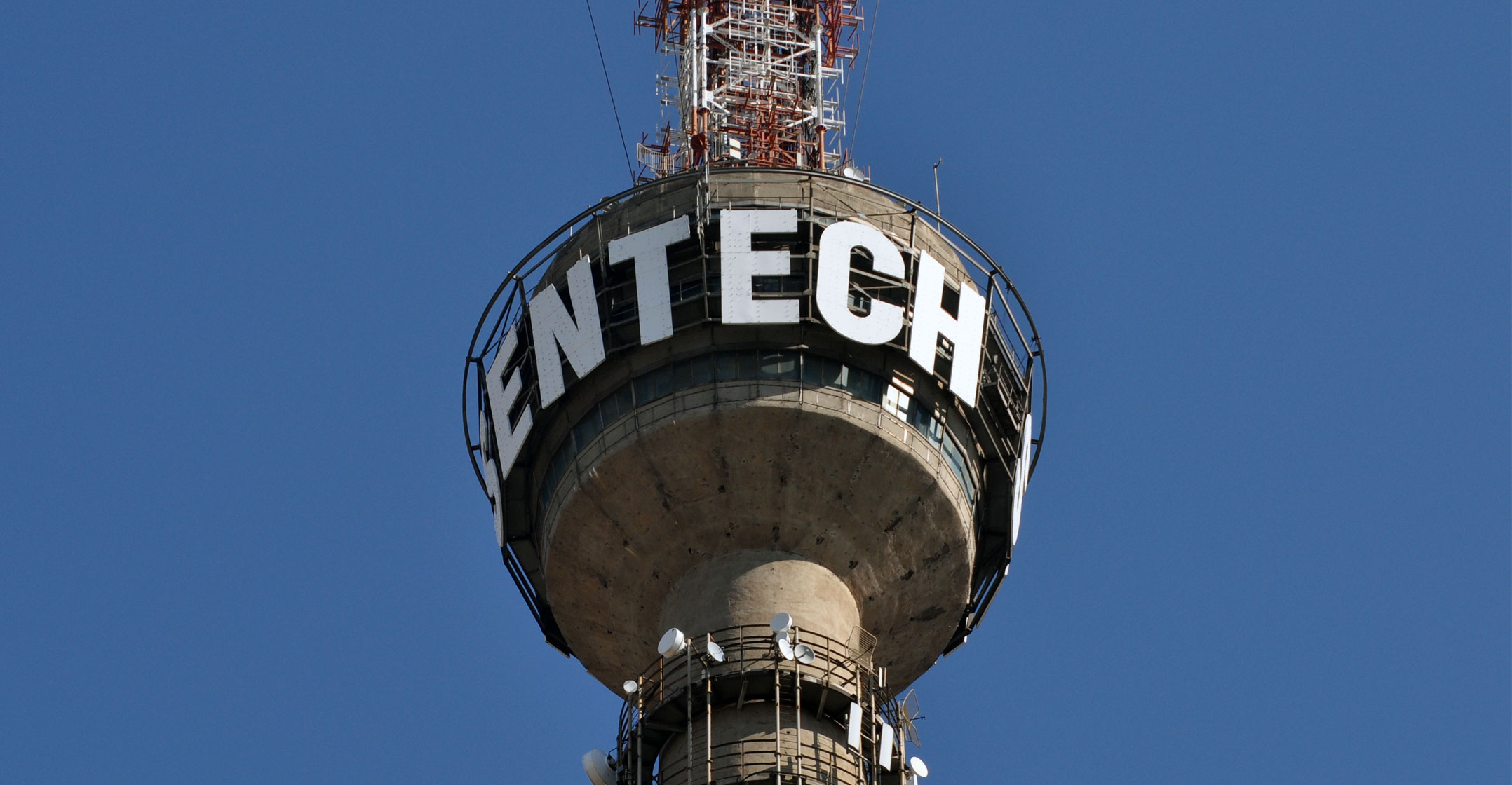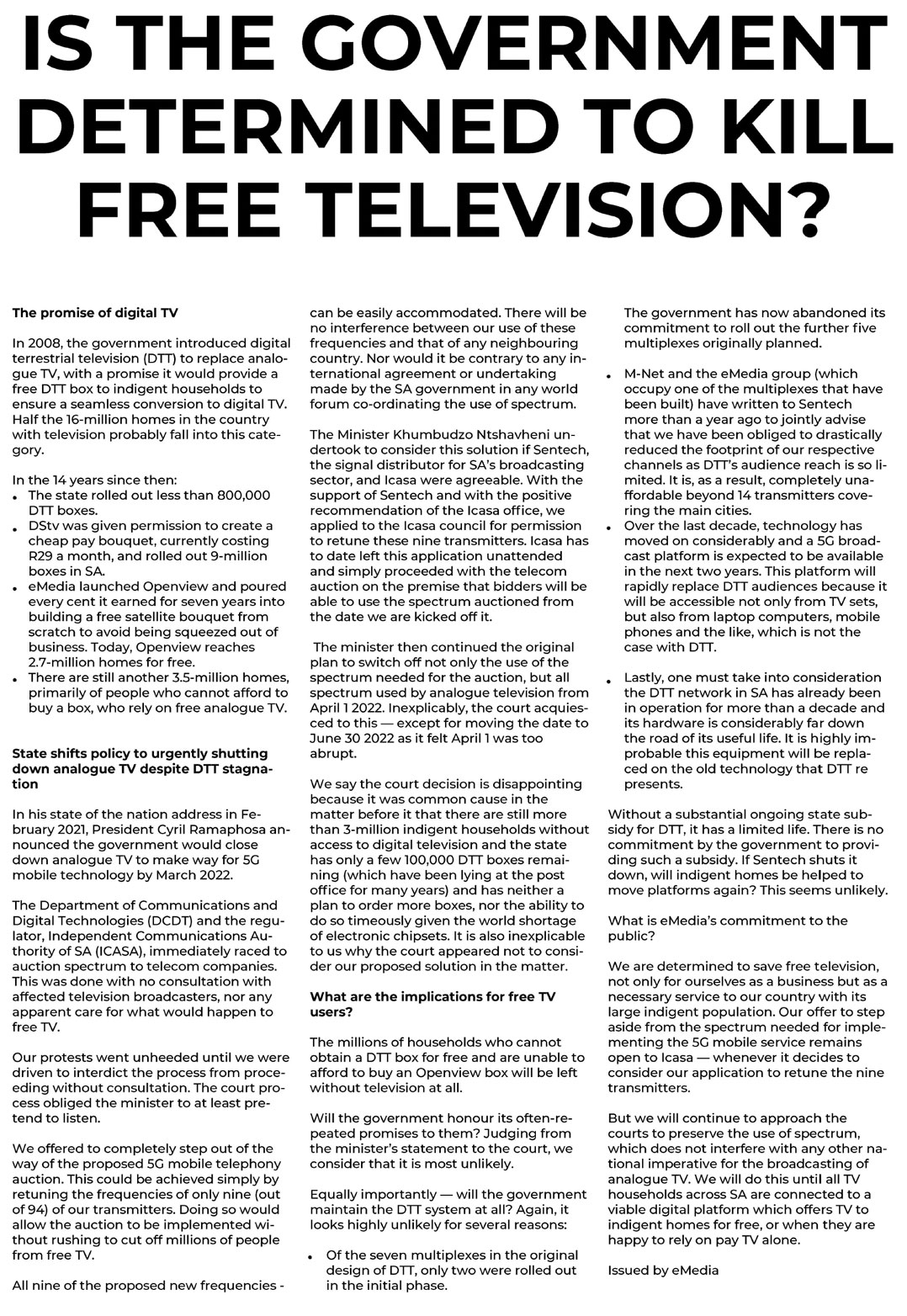 E.tv has filed papers with the constitutional court on an urgent basis seeking to appeal last week’s high court judgment that analogue terrestrial television broadcasts in South Africa be switched off on 30 June.
E.tv has filed papers with the constitutional court on an urgent basis seeking to appeal last week’s high court judgment that analogue terrestrial television broadcasts in South Africa be switched off on 30 June.
TechCentral has learnt that the commercial free-to-air broadcaster filed papers earlier this week with the country’s apex court, seeking to appeal the judgment that forced communications minister Khumbudzo Ntshavheni to delay analogue switch-off, but only by three months – from 31 March to 30 June 2022.
Failing the direct appeal to the constitutional court, the broadcaster is also approaching the high court, conditionally, for leave to appeal the matter to the supreme court of appeal.
If successful, the move could delay the allocation of radio frequency spectrum currently used by broadcasters to telecommunications operators that agreed to pay for access to the frequencies in last month’s spectrum auction conducted by communications regulator Icasa.
E.tv had been hoping for much more time than the high court allowed to complete analogue switch-off, arguing that millions of indigent households risked losing access to free-to-air television. It warned of significant negative implications for broadcasters, including e.tv and its parent eMedia Investments, if this were to happen.
The high court judgment was largely seen as a victory for Ntshavheni, who said in a media statement last week that she was “elated” by the outcome and urged e.tv to “desist from further attempts to derail the process of digital migration”.
She said, too, that the additional three months was “sufficient time” to complete the installation of government-subsidised free digital set-top boxes in qualifying indigent households.
‘Reliant on analogue’
In the papers lodged with the constitutional court, which TechCentral has seen, e.tv said it approached the court directly and on an urgent basis “to protect the rights of millions of indigent South Africans”.
In a founding affidavit, eMedia Investments group executive for legal and regulatory affairs Philippa Rafferty said: “The central issue in this case is the constitutional rights of millions of indigent and vulnerable South Africans who are reliant on analogue television broadcasting to access news, information and entertainment. These millions of South Africans are imminently to have their television signals cut off through a precipitous and unlawful analogue switch-off by the minister … in violation of their constitutional rights.
Read part 1 and part 2 of e.tv’s founding affidavit to the constitutional court
“In brief, e.tv asserts that the minister bears an obligation under section 7(2) of the constitution not to retrogressively deprive South Africans of rights that they have previously enjoyed, including the right to receive information, a component of the right to freedom of expression…”
In an advertorial that eMedia intends to flight in this weekend’s Sunday newspapers – and shared with TechCentral ahead of time – the broadcaster said it had made a proposal to Ntshavheni that could resolve the crisis, freeing up spectrum for telecommunications operators while also allowing it to continue broadcasting on analogue. But eMedia suggested that it encountered resistance to this proposal.

In the advertorial, which TechCentral has published in full below, eMedia said it proposed to government that it would move out of the so-called “digital dividend” bands – frequencies sold to telecoms operators in last month’s auction – if the frequencies of nine (of 94) of its transmitters were to be “re-tuned”, leaving e.tv to broadcast on analogue below 694MHz (out of the digital dividend bands) beyond 30 June.
“Doing so would allow the auction to be implemented without rushing to cut off millions of people from free TV. All nine of the proposed new frequencies can be easily accommodated,” it said.
eMedia claimed that Ntshavheni “undertook to consider this solution if Sentech, the signal distributor for South Africa’s broadcasting sector, and lcasa were agreeable. With the support of Sentech and with the positive recommendation of the lcasa office, we applied to the lcasa council for permission to re-tune these nine transmitters. lcasa has to date left this application unattended and simply proceeded with the telecoms auction on the premise that bidders will be able to use the spectrum auctioned from the date we are kicked off it,” it said.
TechCentral has asked an Icasa spokesman to comment on these claims and will update this article once feedback is received from the regulator.
Asked for comment, a spokeswoman for Ntshavheni said the department of communications intends to oppose e.tv’s application for leave to appeal. “Any delay in accessing the digital dividend through protracted and unmerited court challenges such as that of e.tv seek to perpetuate digital exclusion and furthers the marginalisation of the poor and majority of our people residing in rural areas.”
Article continues below eMedia’s statement…

E.tv’s decision to appeal last week’s high court judgment comes in the same week that the SABC board apologised to Nsthavheni over a media statement the public broadcaster issued last month that criticised the minister’s plan to switch off analogue broadcasts by 31 March.
The statement, issued on 25 March, labelled government’s plan to switch off analogue broadcasts by that date as “premature” and an “unsustainable risk” to the rights of millions of indigent South African households given how few set-top boxes had been distributed.
In an extraordinary response, Ntshavheni threatened to withdraw government financial assistance to the SABC. In a letter to SABC board chairman Bongumusa Makhathini, the minister also threatened to withdraw her support of the broadcaster’s 2020/2021 annual financial and performance reports, among other punitive measures.
But the SABC apology on 6 April said the board “may not have exhausted the agreed procedures (the shareholder’s compact between the SABC and the government of the Republic of South Africa) regarding engagements with the minister”. It’s understood from industry players with knowledge of the situation that the SABC board was divided about whether to issue the apology.
A spokesman for Ntshavheni did not respond to a query from TechCentral about whether the minister intends withdrawing her threats against the SABC in light of its apology to her. – © 2022 NewsCentral Media




